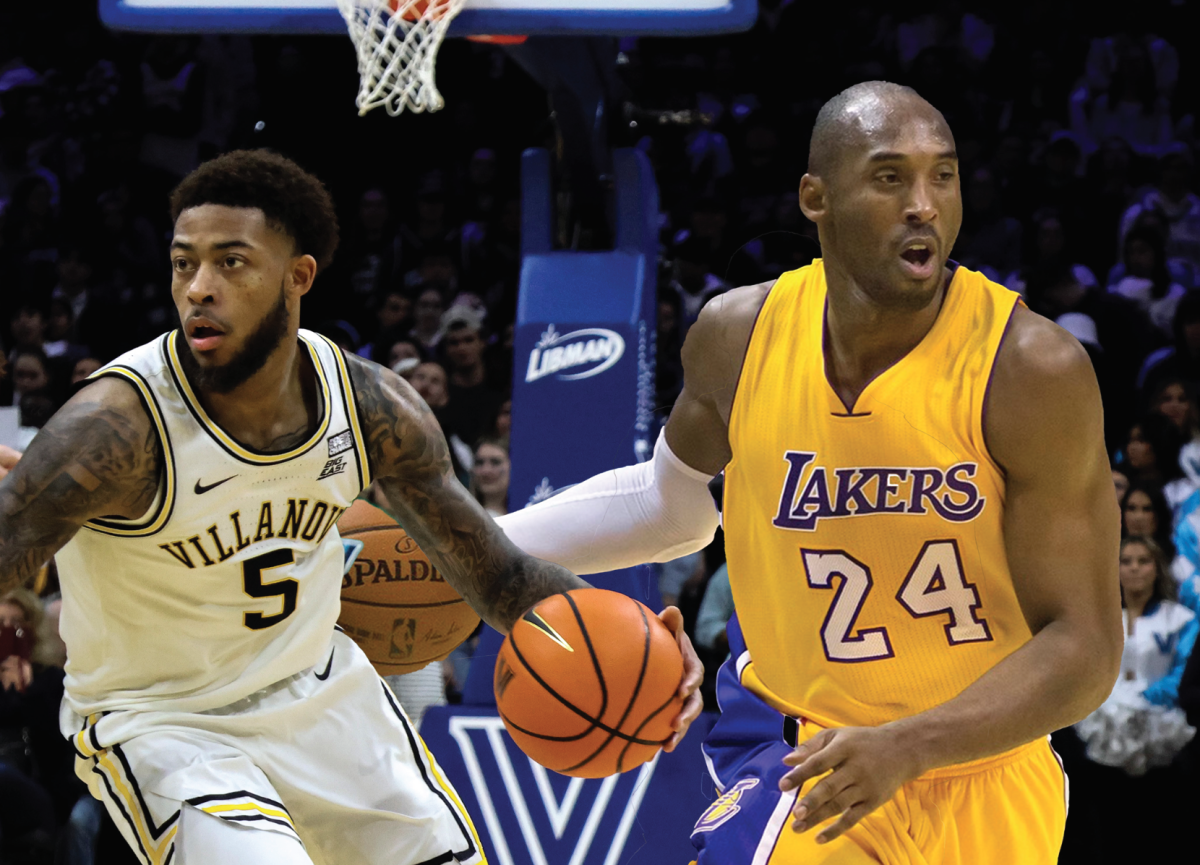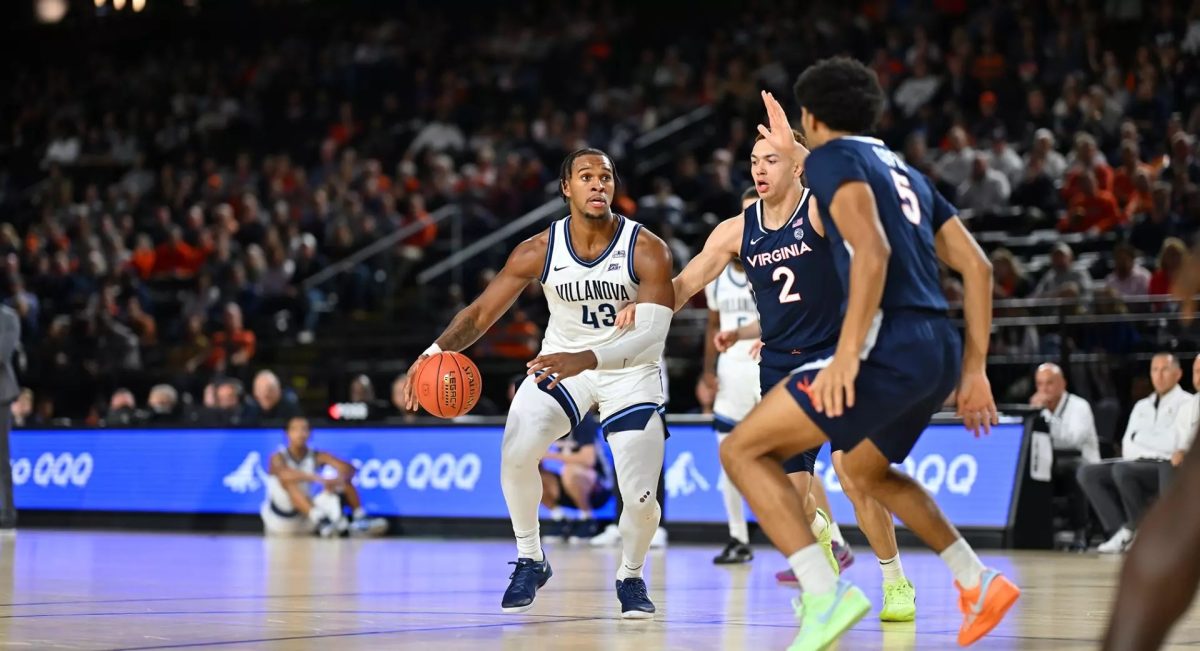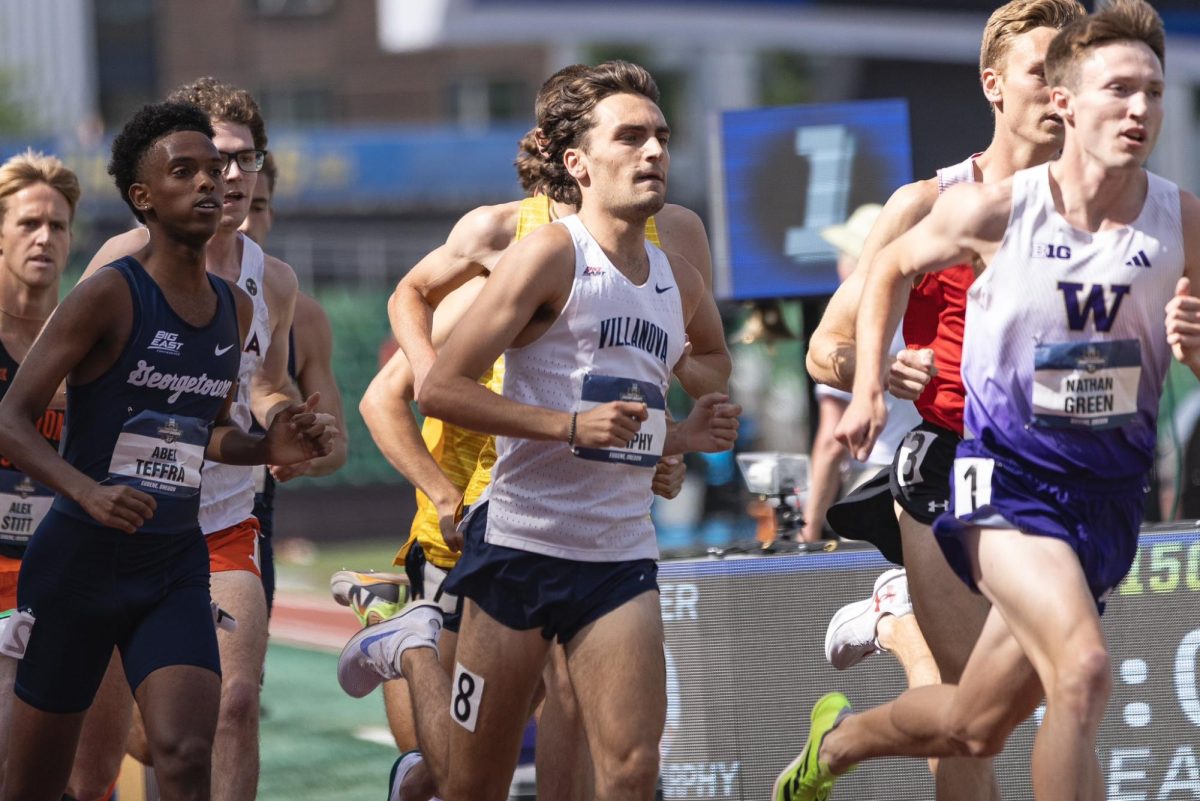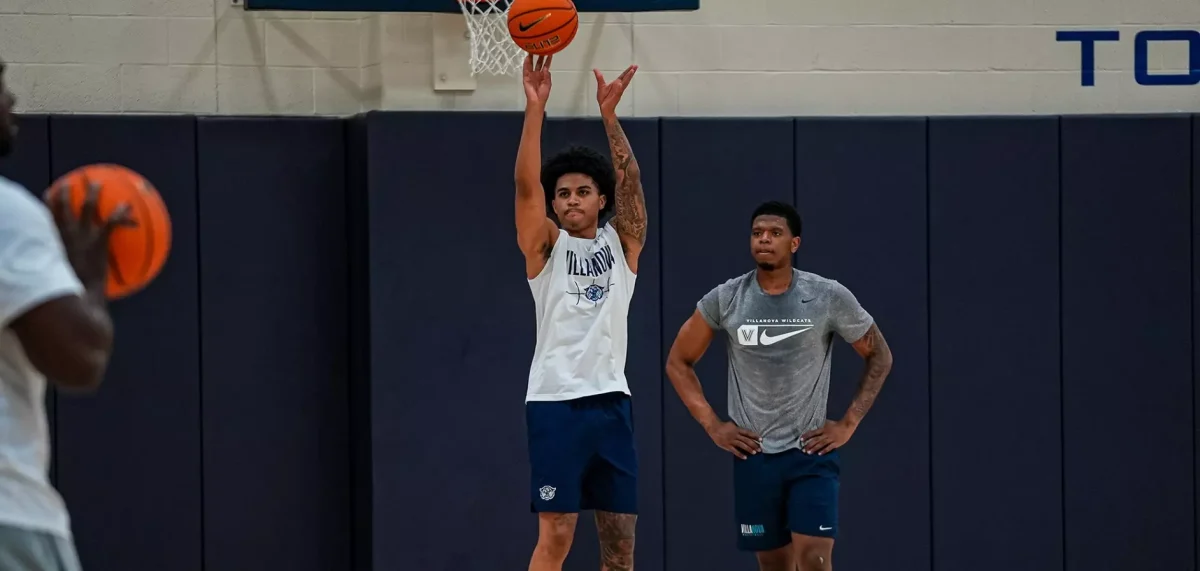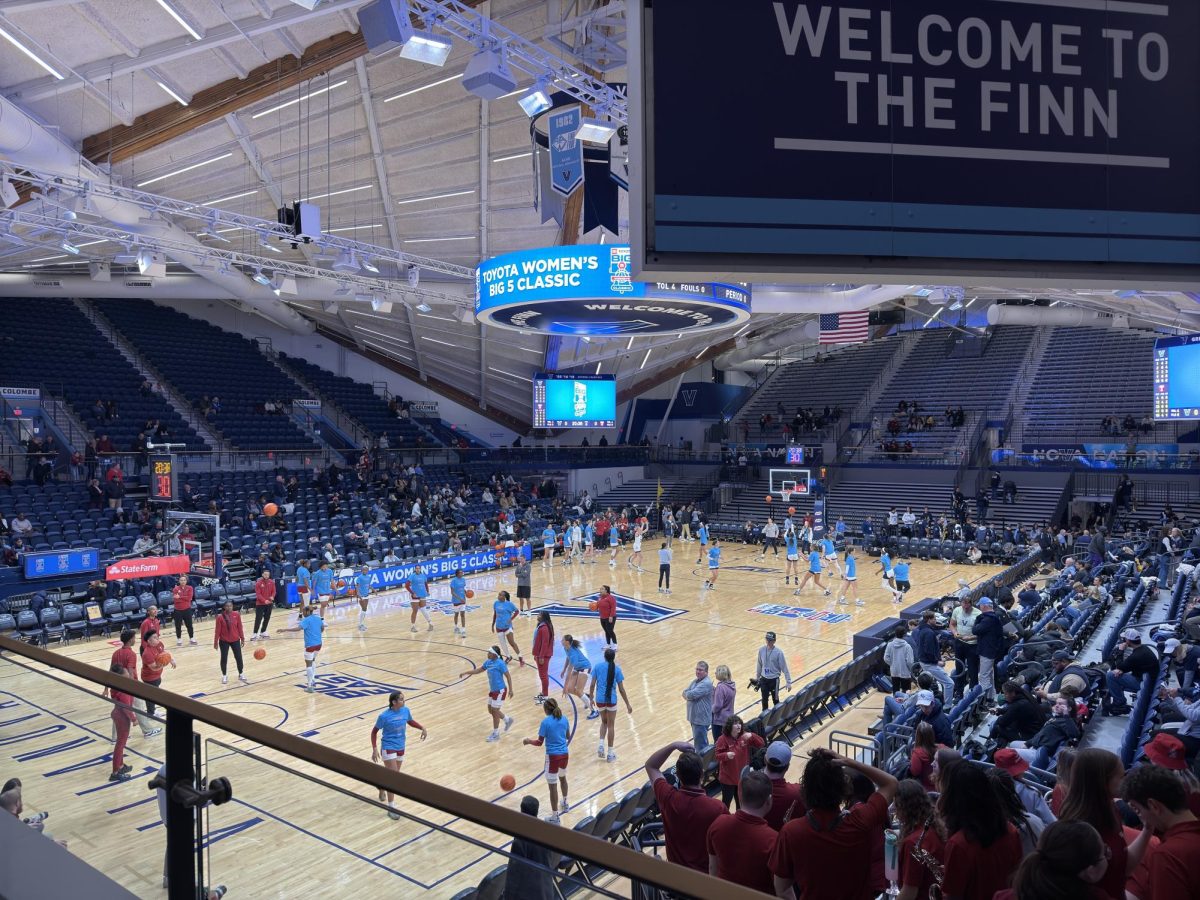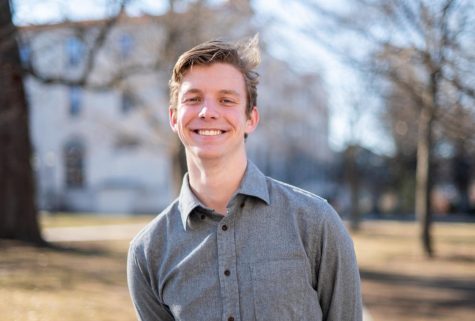Justin Moore is a Kobe guy, from the top of his head to the KB jiblet on his bright blue Crocs.
For Villanova’s best guard, it’s not just a fashion statement. It’s a symbol of dedication to an NBA legend, to a Lakers star with five NBA championships, to the former Lower Merion High standout that became as known for his self-titled mindset as he was for his exploits on the court.
Kobe Bryant was driven by an unmatched passion for basketball. He worked out four times a day, refusing to let his own teammates beat him to the gym. He prided himself on his toughness, once tearing his Achilles, but staying in the game to make two free throws. He scored 60 points in his final game, then devoted himself as heavily to other passions after retiring. An animated short film he produced won an Oscar.
Bryant gave himself the nickname “The Black Mamba,” after the venomous snake. He called his outlook on life “Mamba Mentality.”
Moore wants to live the same way.
“He’s been my favorite player since I picked up a ball,” Moore said, leaning forward in the Finneran Pavilion’s O’Toole Club. “Just watching him grind and seeing his story, and then seeing how mentally tough he is bound to anything in his life, that’s something that I really wanted to be, in terms of being mentally tough.
“Not even just basketball, just as a man. I really look up to him in that aspect.”
—
Moore was born on April 12, 2000. Two months later, on June 19, 2000, Bryant won his first NBA title. The title began a stretch of three straight for Bryant and the Lakers, though Moore was too young to see it.
As Moore got older, Bryant kept winning. When Moore was eight years old, Bryant won the Most Valuable Player award and led the Lakers to the Finals. Though his Washington D.C. living room was thousands of miles away from Los Angeles’s Staples Center, Moore was as close to the action as he could be.
“That’s why I’ve had to get glasses now and have contacts,” Moore said, smiling. “I [was] so close to the TV watching the game. [My parents] kept telling me to back up, but I was glued to the TV.”
The next year, the B-led Lakers returned to the Finals, this time, beating the Celtics. The next year, they won again.
Moore was hooked.
“I didn’t get to see Michael Jordan with my own eyes, but I saw Kobe with my own eyes,” Moore said. “I’ve seen all the crazy stuff he’s done in the game and [seen him win] championships. So here’s my GOAT [Greatest of All Time], always.”
As he got into basketball, he mimicked the Mamba. He had posters on Bryant on his wall, and whenever jerseys were handed out, Moore hoped for Bryant’s #24. He remembers a basketball camp he attended in middle school. He’d spent years working on his jump shot, but for that week, he decided to shoot fadeaway jumpers with his leg out, the way Bryant shot. His parents made him change back to his old jumper, but for that week, he was shooting just like his hero.
For high school, Moore attended national powerhouse DeMatha Catholic, a school that boasts four current NBA players as alums. His freshman year team included future-76ers top pick Markelle Fultz and current Commanders defensive end Chase Young. As a sophomore, he received his first real dose of adversity when he tore his ACL.
Through that injury, Moore leaned on the mentality he’d learned from Bryant.
“That mentality is just in life,” Moore said. “Taking on any challenge and persevering through anything. … Being mentally tough and battling through anything, I really take that in consideration with everything I do.”
Moore’s Kobe fandom remained when he returned to the court. His junior year, he helped DeMatha snap its longest league championship drought, teaming up with 7-foot-2 now-Kansas center Hunter Dickinson. The two knew what to call their partnership. Moore was “Mamba,” after Bryant, while Dickinson was “Diesel,” after Bryant’s Laker teammate Shaquille O’Neal. They were just nicknames, but for the two, it meant more.
Moore committed to Villanova in May 2018. In an interview with The Washington Post, he was succinct: “I’m born a winner, I make winning plays, I score and I defend. I am a Villanova guy.”
—
January 26, 2020 was like any other Sunday. Moore was in his Villanova dorm with his roommate, Eric Dixon, playing 2K with a couple friends. They had played at Providence the day before, and Moore had scored 10 points in a 64-60 win.
Then the reports started coming in. Kobe Bryant, dead at 41 in a helicopter crash. TMZ was among the first to report it. Twitter was full of information. No one was really sure what to believe, until eventually, there were so many saying it that it could only be true.
The dorm room was silent. It stayed that way for hours, only interrupted by sounds of tears. A hero to many, an idol for Moore, gone, decades too soon.
Head coach Jay Wright texted the team that night, then called them together for a meeting on Monday. They talked about Bryant as a basketball player, yes, but as a father, too. As a person. As a man. Wright spoke. Assistant coach George Halcovage spoke. Tears flowed. They talked about Mamba Mentality and the right way to live, and Moore did all he could to internalize that message.
“I definitely think about trying to be the best version of myself I can be,” Moore said, “and that’s something that Kobe tried to do.”
The team played two days later, facing St. John’s in Madison Square Garden. There was a moment of silence for Bryant before the game. The arena lights were dimmed, while the MSG rafters were lit up in Lakers purple and gold. With Jermaine Samuels out injured, Moore started. He played 33 minutes and scored 11 points, helping spark the team to a 79-59 win.
Less than a month later, a memorial service was held for Bryant and his daughter, Gigi, who also died in the crash. When Gigi played basketball, she wore #2. The service was held on 2/24, for both Kobe and Gigi, their numbers symbolized for the memorial. On Twitter, Moore retweeted a message from LeBron James, which read “2/24,” followed by the infinity emoji and a purple and yellow heart. Later that day, Moore tweeted again: he’d been named Big East freshman of the week.
For the rest of the year, Moore’s timeline was filled with tributes to Bryant. Most were retweets, but for some, the messaging was Moore’s own. It was the same on Instagram, with a Highlight of his stories labeled with the crown emoji and a picture of Bryant.
On the court, Moore continued to shine. When the 2019-2020 season was cut short due to the pandemic, Moore averaged 11.3 points and helped Villanova to a 24-7 record and a tie for the Big East regular season championship. As a sophomore, he averaged 12.9 points and started every game he was healthy. He made another step up as a junior, averaging 14.8 points, second-best on the team to graduate guard Collin Gillespie.
That March, Moore and the Wildcats were in the midst of a deep postseason run, playing Houston in San Antonio with a Final Four berth on the line. Villanova led by four with 40 seconds left, and Moore had the ball in his hands. As time ticked off the clock, Moore looked to drive at the rim. When he pushed off his left leg, his Achilles tore. He collapsed, his legs taken out from under him.
In the short term, Moore would miss Villanova’s Final Four matchup. Worse was that recovering from an Achilles tear takes nine months, meaning Moore would be out until the following January. He’d miss the start of the season, at a minimum.
Moore posted four photos, starting with a picture of himself on the AT&T Center bench, in tears. The fourth photo was Bryant, in 2013, sitting on the Staples Center court, holding his own torn left Achilles.
—
Bryant’s final game was the stuff of legend. He was 37 years old, playing on a terrible Lakers team, and had battled injuries throughout the year. Whenever the camera found him on the bench, he looked like something between a mummy and the Michelin Man, drenched in sweat and wrapped in bandages and ice packs.
He’d been expected to limp into the sunset. Instead, he scored 60.
Moore wants something similar. Part of him knows time goes fast, he should enjoy every moment. The other part of him is focused on his Villanova legacy.
“I just want to be known as someone who was a hard worker and that you want to have on your team,” Moore said. “Someone … that’s tough and is going to come out and battle, every single game, no matter what. And opponents know that they have to go against a tough dude like me.”
Some of the reason Moore came back to Villanova was because of that legacy. He missed more than half of the 2022-2023 season with his injury, and when he returned, head coach Kyle Neptune estimated Moore was only playing at around 70% of his typical self. Villanova was significantly better when he returned, even briefly threatening postseason chaos, but its run ended in the Big East tournament quarterfinals.
Moore could have left for the NBA after the season. He could have transferred nearly anywhere in the country, could have played at a school with a better record last season. Instead, he said he had “unfinished business” at Villanova, and chose to finish his collegiate career where he started. Legacy is some of it, but really, Moore wanted more time.
“I wanted to play a full season and get fully healthy,” Moore said. “Allow the offseason and the summer and stuff to really get my body ready to where it’s supposed to be, physically. And then, having the whole season to really finish off how I want to.”
He’ll be Villanova’s unquestioned leader this year, on and off the court. It’s cliche, but the team will go where he takes them. Villanova’s conference rivals know it, with Georgetown’s Ed Cooley saying Moore was “destined to be one of the national players of the year” and that he “wouldn’t be surprised if [he] saw them in the Final Four.” The Wildcats could be really good this year, but it begins and ends with Moore.
Moore doesn’t dream of the Final Four, or at least, doesn’t admit it. He doesn’t know what his perfect season would look like. Like every Villanova player, he wants to be the best team they can be by the end of the season. Whatever that means, he’s ok with it.
With the interview done, he gets up and heads to a side room for another interview. When that finished, he was back on the court. His hero taught him to never let anyone else outwork him, so, with Kobe on his mind, Moore went back to the gym and started shooting again.

